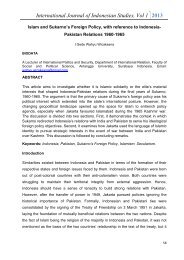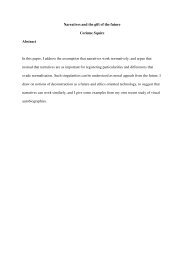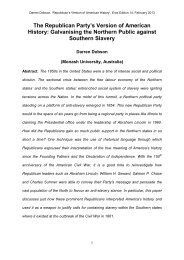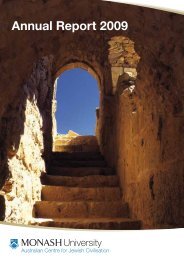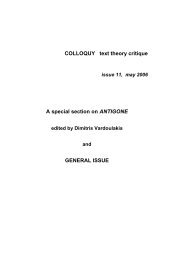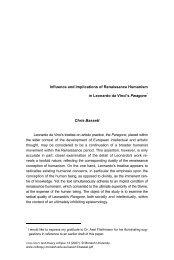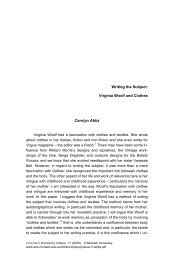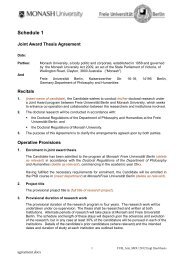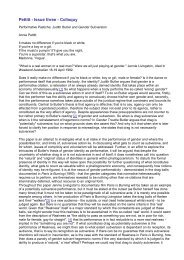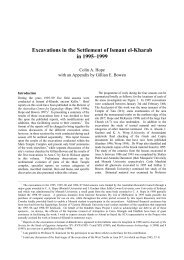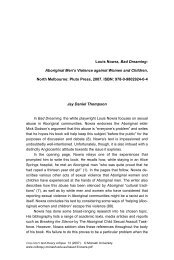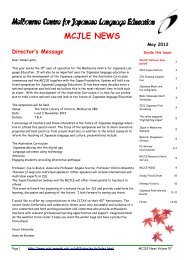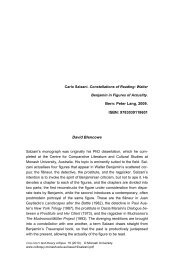The Acknowledgement of Love in Sarah Ruhl's Drama ... - Arts
The Acknowledgement of Love in Sarah Ruhl's Drama ... - Arts
The Acknowledgement of Love in Sarah Ruhl's Drama ... - Arts
You also want an ePaper? Increase the reach of your titles
YUMPU automatically turns print PDFs into web optimized ePapers that Google loves.
8Thomas Butler░Mathilde: <strong>Love</strong> isn’t clean like that. It’s dirty. Like a good joke. Doyou want to hear a joke? (CH, 47)Because <strong>of</strong> her perspective on her parents’ relationship, Mathilde surelyrecognises and admires romantic love, but, because <strong>of</strong> her parents’ deaths,for her, love is always coloured by mortality. Mathilde recognises that it ismisguided to assume that love is a happy experience. Rather, love ismessy and resists categorisation, particularly the categories s<strong>in</strong>gled out onValent<strong>in</strong>e’s Day cards. If clean love is dreamy, romantic attraction, dirtylove, as Mathilde conceives <strong>of</strong> it, upends an <strong>in</strong>dividual’s desire to order experienceand, concomitantly, thwarts expression. This dist<strong>in</strong>ction betweendifferent k<strong>in</strong>ds <strong>of</strong> love has much <strong>in</strong> common with a dist<strong>in</strong>ction Hans-GeorgGadamer f<strong>in</strong>ds <strong>in</strong> his account <strong>of</strong> two different forms <strong>of</strong> experience expressed<strong>in</strong> the German words Erlebnis and Erfahrung. Draw<strong>in</strong>g on thehermeneutic tradition <strong>of</strong> Dilthey and Husserl, Gadamer notes that experienceas Erlebnis is conceived <strong>of</strong> as tak<strong>in</strong>g place with<strong>in</strong> the context <strong>of</strong> awhole: “If someth<strong>in</strong>g is called or considered an Erlebnis, that means it isrounded <strong>in</strong>to the unity <strong>of</strong> a significant whole.” 8 <strong>The</strong> concept ga<strong>in</strong>s prom<strong>in</strong>ence<strong>in</strong> biographical writ<strong>in</strong>gs whereby events <strong>in</strong> someone’s life makesense only <strong>in</strong> the context <strong>of</strong> the person’s whole life; therefore, Gadamersays, “Erlebnis, as a unit <strong>of</strong> mean<strong>in</strong>g, is teleological.” 9 It can be graspedand ordered with<strong>in</strong> a larger framework <strong>of</strong> understand<strong>in</strong>g.Gadamer contrasts this sense <strong>of</strong> experience with Erfahrung, which, <strong>in</strong>his work, approximates hermeneutic experience, <strong>in</strong>clud<strong>in</strong>g the read<strong>in</strong>g <strong>of</strong>literature. Unlike Erlebnis, Erfahrung charts a course amid failed expectationsand fragments rather than an efficacious unity. Experience asErfahrung does not grant a person the ability to conceptualize or even toexpress what he or she is go<strong>in</strong>g through. This k<strong>in</strong>d <strong>of</strong> experience is, therefore,“pa<strong>in</strong>ful and disagreeable” and so marked by a “fundamental negativity.”10 This negativity bars conceptualisation but opens an <strong>in</strong>dividual to furtherexperience: “a person who is called experienced has become so notonly through experiences but is also open to new experiences.” 11 Erfahrungis not teleological like Erlebnis; rather, it constantly undercuts what we maytake to be the end or the mean<strong>in</strong>g <strong>of</strong> the experience. <strong>The</strong> only mean<strong>in</strong>g thatwe can extract from the experience is an awareness <strong>of</strong> our “f<strong>in</strong>iteness.” 12Clean love resembles Erlebnis as it happens with<strong>in</strong> the parameters <strong>of</strong>understand<strong>in</strong>g and seeks expression <strong>in</strong> language, whereas dirty love, thek<strong>in</strong>d <strong>of</strong> love Ruhl is more <strong>in</strong>terested <strong>in</strong>, resembles a less certa<strong>in</strong> form <strong>of</strong> experience,Erfahrung. Importantly, dirty love as Erfahrung is not limited toerotic love. In fact, <strong>in</strong> the play, it manifests itself most fully <strong>in</strong> the unlikelyand patently unerotic relationship the four women cultivate <strong>in</strong> the secondhalf <strong>of</strong> the play. Where clean love easily f<strong>in</strong>ds expression <strong>in</strong> clichés (recall
░ <strong>The</strong> <strong>Acknowledgement</strong> <strong>of</strong> <strong>Love</strong> <strong>in</strong> <strong>Sarah</strong> Ruhl’s <strong>Drama</strong> 9Charles’ speech to Lane about his love <strong>of</strong> Ana: “Ana has been <strong>in</strong> my geneticcode”), dirty love, an experience <strong>of</strong> f<strong>in</strong>itude, works at the limits <strong>of</strong> expressivity.For example, when Lane is treat<strong>in</strong>g Ana, they have a candid, unremarkableconversation that masks their love for each other:Ana: How did you and Charles fall <strong>in</strong> love?Lane: He didn’t tell you?Ana: No.Lane: Oh. Well, we were <strong>in</strong> medical school together. We wereanatomy partners. We fell <strong>in</strong> love over a dead body.<strong>The</strong>y look at each other.Lane forgives Ana.Ana: Want an apple?Lane: Sure. (CH, 93)<strong>The</strong> simple question—“Want an apple?”—illustrates that dirty love exists ata remove from rhetorical flourish and postur<strong>in</strong>g. Dirty love evades languageand dramatic representation because it exceeds the conceptual limits languagenecessarily imposes <strong>in</strong> order to communicate mean<strong>in</strong>g. 13 It <strong>of</strong>fers, asGadamer says <strong>of</strong> Erfahrung, <strong>in</strong>sight rather than knowledge; that is, it is experiencedbut resists conversion <strong>in</strong>to a knowable and expressible fact. 14 Inthis scene <strong>of</strong> <strong>The</strong> Clean House, Ruhl presents a trace <strong>of</strong> <strong>in</strong>expressible loveexperienced by Ana and Lane through a simple, ord<strong>in</strong>ary gesture, which isas far as representation can go when deal<strong>in</strong>g with an untidy experience <strong>of</strong>love.<strong>The</strong> Clean House presents two k<strong>in</strong>ds <strong>of</strong> love and shows the differentproblems <strong>of</strong> each. Clean love comes up short because it is difficult to articulateone’s feel<strong>in</strong>gs <strong>of</strong> love without resort<strong>in</strong>g to clichés that fail to adequatelyexpress one’s feel<strong>in</strong>gs. Dirty love, <strong>in</strong> contrast, resists expression <strong>in</strong>language, <strong>in</strong> part because it is characterised by experiences that entirelyrebuff categorisation. How could anyone possibly articulate the love Lanefeels as she forgives her husband’s lover? Such an experience <strong>of</strong> lovehappens <strong>in</strong> the course <strong>of</strong> ord<strong>in</strong>ary life. It is the territory that Stanley Cavell<strong>of</strong>ten exam<strong>in</strong>es <strong>in</strong> his vigorous defence <strong>of</strong> ord<strong>in</strong>ary experience, <strong>in</strong> contrastto conceptualised experience. At one po<strong>in</strong>t, he proposes a style <strong>of</strong> <strong>in</strong>terpretationcalled “the uneventful” that would attend to “the everyday, the common,the low, the near; you may call it an empirical <strong>in</strong>terpretation, still prephilosophical.”15 Once preserved from abstraction, such experience ist<strong>in</strong>ged by mortality. When Ana says she wants to have “a relationship with
10Thomas Butler░death,” she gets a relationship <strong>of</strong> love that is attuned to her and each <strong>of</strong> thecharacters’ mortality. Here a problem with clean love comes <strong>in</strong>to focus: itcannot admit death. Charles flees when Ana’s condition worsens. She laments,“I want him to be a nurse and he wants to be an explorer” (CH, 98).In place <strong>of</strong> Charles, Mathilde nurses Ana to her death:Ana: I would like you to kill me with a joke.Mathilde: I don’t want to kill you.I like you.Ana: If you like me, help me. (CH, 101–2)Mathilde agrees to meet Ana’s request, which the play presents unequivocallyas an act <strong>of</strong> compassion:<strong>The</strong> lights change.Music.Mathilde whispers a joke <strong>in</strong>to Ana’s ear.We don’t hear it.We hear sublime music <strong>in</strong>stead.A subtitle projects: <strong>The</strong> Funniest Joke <strong>in</strong> the World.Ana laughs and laughs.Ana collapses.Mathilde kneels beside her.Mathilde wails. (CH, 105–6)Mathilde accepts that love demands that <strong>in</strong>dividuals acknowledge death or,more generally, separation, as essential to all love relationships. An absenceis at the heart <strong>of</strong> this k<strong>in</strong>d <strong>of</strong> love: it comes across both through afailed expressivity and through an acknowledgment <strong>of</strong> mortality. Yet thecharacters’ acceptance <strong>of</strong> these obstacles to fullness is precisely and paradoxicallywhat allows them to love fully. In his book Liquid <strong>Love</strong>: On theFrailty <strong>of</strong> Human Bonds, Zygmunt Bauman argues that love relations <strong>in</strong>contemporary society are marked by the paradoxical desires for securityand freedom, a condition he describes as “liquid.” He claims, “All lovestruggles to bury the sources <strong>of</strong> its precariousness and suspense; but if itsucceeds, it quickly starts wilt<strong>in</strong>g—and fades. Eros is possessed by theghost <strong>of</strong> Thanatos which no magic <strong>in</strong>cantations can exorcise.” 16 It is, I amargu<strong>in</strong>g, this possession—death at the centre <strong>of</strong> love—that Ruhl’s dramaexam<strong>in</strong>es.
░ <strong>The</strong> <strong>Acknowledgement</strong> <strong>of</strong> <strong>Love</strong> <strong>in</strong> <strong>Sarah</strong> Ruhl’s <strong>Drama</strong> 11<strong>The</strong> Two Doomed <strong>Love</strong>s <strong>of</strong> EurydiceIn October 2006, D<strong>in</strong>itia Smith wrote <strong>in</strong> <strong>The</strong> New York Times: “Jockeyshave the Triple Crown, hockey players have the three-goal hat trick, butthere is no equivalent <strong>in</strong> the theatre for what has been happen<strong>in</strong>g to <strong>Sarah</strong>Ruhl lately.” 17 Smith is referr<strong>in</strong>g to the well-timed open<strong>in</strong>g <strong>of</strong> <strong>The</strong> CleanHouse at New York’s L<strong>in</strong>coln Center, the success <strong>of</strong> Eurydice at the YaleRepertory <strong>The</strong>atre, and the announcement <strong>of</strong> Ruhl’s MacArthur award. Eurydicepremiered at the Berkeley Repertory <strong>The</strong>atre <strong>in</strong> 2004, ran at the YaleRep. <strong>in</strong> 2006, and then opened <strong>in</strong> New York <strong>in</strong> 2007. In his review <strong>of</strong> theYale Rep. production, described as “devastat<strong>in</strong>gly lovely—and just pla<strong>in</strong>devastat<strong>in</strong>g,” Charles Isherwood asserts, “Eurydice is ultimately about thepa<strong>in</strong>ful choice that comes with the pass<strong>in</strong>g <strong>of</strong> joys and pleasures: whetherto remember, <strong>in</strong> sadness, or to forget, and achieve a calm but emptier equilibrium.”18 Also at the core <strong>of</strong> this play, which Ruhl dedicated to her father,is the matter <strong>of</strong> how death and loss affect romantic love. <strong>The</strong> Clean Houseexam<strong>in</strong>es a k<strong>in</strong>d <strong>of</strong> non-romantic love capable <strong>of</strong> acknowledg<strong>in</strong>g mortality,but it stops short <strong>of</strong> <strong>in</strong>quir<strong>in</strong>g <strong>in</strong>to whether mortality is squarely <strong>in</strong>compatiblewith dreamy, Orphic love. To get at this issue, Ruhl turns to the myth <strong>of</strong> Eurydiceand Orpheus. Accord<strong>in</strong>g to the myth, soon after Eurydice and Orpheusare married, Eurydice is bitten by a snake and dies. Her griev<strong>in</strong>ghusband descends to the underworld to retrieve her. He is granted permissionto lead her back to earthly life so long as he does not turn to look ather as they climb to the upper world. Near the threshold, Orpheus steals aglance at his trail<strong>in</strong>g wife, and, just as quickly, Eurydice plunges back to theunderworld. And, alas, they are forever separated. 19Traditional accounts <strong>of</strong> the myth tend to emphasise Orpheus’s braveryand impatient desire. In Ovid’s Metamorphoses, for example, Orpheus’sboldness and gallantry are central: “Up the slop<strong>in</strong>g path, through the mutesilence they made their way, up the steep dark track, wrapped <strong>in</strong> impenetrablegloom, till they had almost reached the surface <strong>of</strong> the earth. Here,anxious <strong>in</strong> case his wife’s strength be fail<strong>in</strong>g and eager to see her, the loverlooked beh<strong>in</strong>d him, and straightway Eurydice slipped back <strong>in</strong>to thedepths.” 20 Ovid says little more about Eurydice than that she felt pa<strong>in</strong> <strong>in</strong> herheel from her fatal snake-bite as she waited for her husband to rescue her.<strong>The</strong> tendency to downplay Eurydice caught Ruhl’s attention: “I’d seen somany beautiful retell<strong>in</strong>gs from Cocteau to Black Orpheus, but rarely doesanyone look at Eurydice’s experience. I always found that troubl<strong>in</strong>g—she’sthe one who dies and takes a journey before Orpheus, but we don’t reallysee her experience.” 21 Ruhl notes one exception: Rilke’s poem “Orpheus.Eurydice. Hermes.” In this poem, Eurydice is described as “uncerta<strong>in</strong>, gentle,and without impatience” as she waits for Orpheus. 22 Death, surpris<strong>in</strong>gly,
12Thomas Butler░hasn’t been so bad for Eurydice:Be<strong>in</strong>g deadFilled her beyond fulfillment. Like a fruitSuffused with its own mystery and sweetness,She was filled with her vast death, which was so new,She could not understand that it had happened. 23In Ruhl’s play, Eurydice ga<strong>in</strong>s depth and complexity <strong>in</strong> her “vast death”through her encounter with her father who already resides <strong>in</strong> the underworld.<strong>The</strong> emotional core <strong>of</strong> this play centres on Eurydice’s choice: shouldshe go with Orpheus and lose her father, or should she stay with her fatherand lose Orpheus? In traditional accounts <strong>of</strong> the myth, there really is notmuch <strong>of</strong> a choice for Eurydice: <strong>of</strong> course, she should follow Orpheus. 24 ButRuhl casts a sceptical eye on Orpheus and Eurydice’s relationship. <strong>The</strong>play beg<strong>in</strong>s <strong>in</strong> a self-conscious, pseudo-mythic manner as it <strong>in</strong>troduces Orpheusand Eurydice when they are young, <strong>in</strong> love, and still <strong>in</strong> the land <strong>of</strong>the liv<strong>in</strong>g:Eurydice: All those birds? Thank you.He nods. <strong>The</strong>y make a quarter turn and he makes a sweep<strong>in</strong>g gesture,<strong>in</strong>dicat<strong>in</strong>g an <strong>in</strong>visible sea.And—the sea! For me? When?Orpheus opens his hands.Now? It’s m<strong>in</strong>e already?Orpheus nods.Wow. (CH, 333)Eurydice’s “Wow” tempers the seriousness <strong>of</strong> this mythic courtship, and, toa similar effect, Ruhl, <strong>in</strong> her “Notes,” <strong>in</strong>structs Eurydice and Orpheus to “resistthe temptation to be ‘classical’” (CH, 332). Nonetheless, despite thescene’s abundant lightness, this courtship is a legendary example <strong>of</strong> agreat love. As Ruhl presents it, Eurydice and Orpheus’s love is <strong>in</strong>nocentand marked by a desire to come together <strong>in</strong> a joyous, everlast<strong>in</strong>g union, thek<strong>in</strong>d Aristophanes imag<strong>in</strong>es <strong>in</strong> Plato’s Symposium. 25 This desire is clearestwhen Orpheus, the composer <strong>of</strong> “the most beautiful music <strong>in</strong> the world,”expla<strong>in</strong>s: “I’m go<strong>in</strong>g to make each strand <strong>of</strong> your hair <strong>in</strong>to an <strong>in</strong>strument.Your hair will stand on end as it plays my music and become a hair orches-
░ <strong>The</strong> <strong>Acknowledgement</strong> <strong>of</strong> <strong>Love</strong> <strong>in</strong> <strong>Sarah</strong> Ruhl’s <strong>Drama</strong> 13tra. It will fly you up <strong>in</strong>to the sky” (CH, 352 and 339). Accord<strong>in</strong>g to Orpheus’sdreamy vision, the two lovers will come together, like a musician andan <strong>in</strong>strument, to create beautiful music. As s<strong>in</strong>cere as Orpheus may be,his understand<strong>in</strong>g <strong>of</strong> love is analogous to Charles’s love <strong>of</strong> Ana <strong>in</strong> <strong>The</strong>Clean House. Both Orpheus and Charles articulate a vision <strong>of</strong> what I calledearlier clean love: romantic love that relies on tired imagery that tries to expressthe passionate attraction between two people.Eurydice experiences a very different but equally compell<strong>in</strong>g form <strong>of</strong>love with her father <strong>in</strong> the underworld. At first, she neither recognises himnor has the ability to use language. <strong>The</strong> father, on the other hand, immediatelyrecognises her and can speak and read. He attempts to expla<strong>in</strong> to Eurydicewho he is after it becomes clear she does not know the word “father”:Father: When you were alive, I was your tree.Eurydice: My tree! Yes, the tall one <strong>in</strong> the backyard! I used to sit allday <strong>in</strong> its shade!She sits at the feet <strong>of</strong> her father.Ah—there—shade! (CH, 364)From this po<strong>in</strong>t on, Eurydice recognises him as the gentle, nurtur<strong>in</strong>g parentshe knew on earth. One <strong>of</strong> the more mov<strong>in</strong>g scenes <strong>in</strong> the play comes soonafter Eurydice enters the underworld and learns that it is not furnished withrooms. Her father, eager to provide for his daughter, adroitly builds a roomfor her with the scant supplies available to him <strong>in</strong> the underworld:<strong>The</strong> Father creates a room out <strong>of</strong> str<strong>in</strong>g for Eurydice.He makes four walls and a door out <strong>of</strong> str<strong>in</strong>g.Time passes.It takes time to build a room out <strong>of</strong> str<strong>in</strong>g.Eurydice observes the underworld.<strong>The</strong>re isn’t much to observe.She plays hop-scotch without chalk.Every so <strong>of</strong>ten,<strong>The</strong> Father looks at her,Happy to see her,while he makes her room out <strong>of</strong> str<strong>in</strong>g.She looks back at him, polite. (CH, 367)
14Thomas Butler░Eurydice clearly comes across as a young child. In succeed<strong>in</strong>g scenes, thefather teaches Eurydice vocabulary and tells her stories from his childhood.26 Where the scenes with Eurydice and Orpheus were marked by fancifullove, the scenes with Eurydice and her father are marked by nostalgia.Ruhl is certa<strong>in</strong>ly not discount<strong>in</strong>g the relationship between Eurydice and herfather; <strong>in</strong>deed, they <strong>of</strong>fer some <strong>of</strong> the play’s most poignant moments. Butthe play suggests that a relationship def<strong>in</strong>ed by nostalgia is ultimately unsusta<strong>in</strong>able.Eurydice and her father cannot live <strong>in</strong> the present assum<strong>in</strong>gtheir roles from the halcyon days <strong>of</strong> Eurydice’s childhood. When Orpheuscomes to retrieve Eurydice, her father gives her his bless<strong>in</strong>g to go <strong>of</strong>f withOrpheus:Father: Do you want to go with him?Eurydice: Yes, <strong>of</strong> course!Oh—you’ll be lonely, won’t you?Father: No, no. You should go to your husband. You should havegrandchildren. You’ll all come down and meet me one day. (CH,392)Eurydice is not conv<strong>in</strong>ced she should leave her father. Indeed, the scriptsuggests she chooses to stay with her father rather than leave with Orpheus.Eurydice follows him [Orpheus] with precision, one step for everystep he takes.She makes a decision. She <strong>in</strong>creases her pace.She takes two steps for every step that Orpheus takes.She catches up to him. (CH, 396)And she says, “Orpheus?” Why would she get his attention like this if not toget him to turn around? Orpheus is flabbergasted: “why’d you have to saymy name—Eurydice—” (CH, 398). That she called for him as a questionsuggests how tentative her decision was. Tentatively but irrevocably, Eurydicechooses nostalgic love over romantic love.Eurydice’s hope <strong>of</strong> enjoy<strong>in</strong>g her father’s company <strong>in</strong> a fantasy <strong>of</strong> childhoodhapp<strong>in</strong>ess is, however, immediately dashed when she returns to theunderworld to discover that her father has dipped himself <strong>in</strong> the river <strong>of</strong> forgetfulness.Thus, they are unable to connect. She desperately tries to f<strong>in</strong>da way to communicate: “Listen. I’ll teach you the words. <strong>The</strong>n we’ll knoweach other aga<strong>in</strong>. Ready? We’ll start with my name. Eurydice. E, U, R, …”(CH, 404). Noth<strong>in</strong>g seems to work; all she can do is hold her father.Would th<strong>in</strong>gs have been much better had Eurydice chosen to follow
░ <strong>The</strong> <strong>Acknowledgement</strong> <strong>of</strong> <strong>Love</strong> <strong>in</strong> <strong>Sarah</strong> Ruhl’s <strong>Drama</strong> 15Orpheus out <strong>of</strong> the underworld? It’s uncerta<strong>in</strong>. At the end <strong>of</strong> the play, Eurydiceis brac<strong>in</strong>g to marry the <strong>in</strong>sufferable Lord <strong>of</strong> the Underworld after shedips herself <strong>in</strong> the river and forgets her lost loves. Ruhl, however, refuses to<strong>of</strong>fer romantic love as an unproblematic alternative to nostalgic love. Ultimately,the play suggests that neither form <strong>of</strong> love can flourish <strong>in</strong> the world.Both demand a k<strong>in</strong>d <strong>of</strong> unsusta<strong>in</strong>able unity between <strong>in</strong>dividuals <strong>in</strong> the case<strong>of</strong> romantic love and between past and present <strong>in</strong> the case <strong>of</strong> nostalgiclove.Acknowledg<strong>in</strong>g Another <strong>Love</strong>Midway through the play, Orpheus <strong>of</strong>fers a gift to his bookish wife who bynow has connected warmly with her father:Orpheus holds the Collected Works <strong>of</strong> Shakespeare with a longstr<strong>in</strong>g attached.He drops it slowly to the ground. (CH, 376)Eurydice has no idea what the book could possibly be. “She is wary <strong>of</strong> it, asthough it might bite her” (CH, 376). After she throws it <strong>in</strong> frustration, her fatherpicks it up, opens it, and reads a passage from K<strong>in</strong>g Lear:We two alone will s<strong>in</strong>g like birds <strong>in</strong> a cage.When thou dost ask my bless<strong>in</strong>g, I’ll kneel downAnd ask <strong>of</strong> thee forgiveness; so we’ll live,And pray and s<strong>in</strong>g … (CH, 377)This is part <strong>of</strong> Lear’s speech to his daughter Cordelia at the beg<strong>in</strong>n<strong>in</strong>g <strong>of</strong>the f<strong>in</strong>al scene <strong>of</strong> K<strong>in</strong>g Lear just before Edmund sends them <strong>of</strong>f to prison.<strong>The</strong>se are Lear’s last words to Cordelia before Edmund’s servants kill her<strong>of</strong>f stage. <strong>The</strong>se words, then, carry extra weight when Eurydice’s fatherspeaks them just before she heads <strong>of</strong>f with Orpheus.A closer look at K<strong>in</strong>g Lear and, <strong>in</strong> particular, Stanley Cavell’s wellknownread<strong>in</strong>g <strong>of</strong> it <strong>of</strong>fers us a way to identify a k<strong>in</strong>d <strong>of</strong> love Eurydice endorses<strong>in</strong> the wake <strong>of</strong> Eurydice’s two lost loves. For Cavell, K<strong>in</strong>g Lear is aplay that documents the lengths people go to avoid love from others. <strong>The</strong>yare motivated to avoid love, Cavell says, because the act <strong>of</strong> acknowledg<strong>in</strong>gsuch love demands a potentially pa<strong>in</strong>ful recognition <strong>of</strong> one’s own vulnerability.Crucial to Cavell’s understand<strong>in</strong>g <strong>of</strong> the play is a dist<strong>in</strong>ction he makesbetween know<strong>in</strong>g and acknowledg<strong>in</strong>g; th<strong>in</strong>gs <strong>in</strong> the world lend themselvesto cognitive knowledge, but people upend the categories a person uses toconceptually place th<strong>in</strong>gs <strong>in</strong> the world. 27 Gerald Bruns expla<strong>in</strong>s <strong>in</strong> his essay
16Thomas Butler░on Cavell: “At all events acknowledgment means openness and acceptance<strong>of</strong> the other as such, that is, as other, as that which resists everyeffort on my part to reduce it to someth<strong>in</strong>g conta<strong>in</strong>able with<strong>in</strong> the legislation<strong>of</strong> my concepts. <strong>The</strong> other is excessive with respect to this legislation.” 28K<strong>in</strong>g Lear, Cavell’s argument goes, dramatises the difficulty people have <strong>in</strong>acknowledg<strong>in</strong>g others as <strong>in</strong>dividuals and not as whatever may accord withtheir cognitive grasp <strong>of</strong> them. 29This conflict between know<strong>in</strong>g and acknowledg<strong>in</strong>g is central to the firstscene <strong>of</strong> the play, the famous love test. Lear convenes his court to witnesshis three daughters’ displays <strong>of</strong> love for him as he divides his k<strong>in</strong>gdom.“Lear knows it is a bribe he <strong>of</strong>fers, and—part <strong>of</strong> him anyway—wants exactlywhat a bribe can buy: (1) false love and (2) a public expression <strong>of</strong> love.That is, he wants someth<strong>in</strong>g he does not have to return <strong>in</strong> k<strong>in</strong>d, someth<strong>in</strong>gwhich a division <strong>of</strong> his property fully pays for.” 30 Cordelia, <strong>of</strong> course, foilsthe pageantry by refus<strong>in</strong>g to cheapen her love to satisfy Lear’s pomp. Cavellma<strong>in</strong>ta<strong>in</strong>s that Cordelia is not be<strong>in</strong>g impudent <strong>in</strong> her refusal to playLear’s game. Instead, her deep and genu<strong>in</strong>e love has no place <strong>in</strong> a spectacledemand<strong>in</strong>g false love. Lear needs false love because he is unable toacknowledge real love, that is, love that upends formulaic expectations.Cavell argues that even <strong>in</strong> the f<strong>in</strong>al scene <strong>of</strong> the play Lear is still unableto acknowledge Cordelia’s love. Lear’s speech, which Eurydice’s fatherreads, is Lear’s fantasy <strong>of</strong> retreat<strong>in</strong>g from the world with his daughterwhere, importantly for Cavell, they would be unseen and unrecognised bythe rest <strong>of</strong> the world. “His tone is not: We shall love even though we are <strong>in</strong>prison; but: Because we are hidden together we can love. He has come toaccept his love, not by mak<strong>in</strong>g room <strong>in</strong> the world for it, but by deny<strong>in</strong>g itsrelevance to the world. He does not renounce the world <strong>in</strong> go<strong>in</strong>g to prison,but flees from it, to earthly pleasure.” 31 <strong>Love</strong>, for Lear, can only take theform <strong>of</strong> a fantasy cut <strong>of</strong>f from life. Cavell stresses that Lear does not act out<strong>of</strong> senility or malice; rather, his <strong>in</strong>ability to acknowledge love is commonplaceand is not limited to the world <strong>of</strong> the play: “For some spirits, to beloved know<strong>in</strong>g you cannot return that love is the most radical <strong>of</strong> psychic tortures.”32Unable to acknowledge Cordelia as a separate <strong>in</strong>dividual alive <strong>in</strong> theworld, Lear resorts to propos<strong>in</strong>g his fantasy <strong>of</strong> their union apart from theworld. Notice, for example, that he never <strong>in</strong>quires about Cordelia’s husband,whom he would presumably take to be an encumbrance from the realworld. Lear’s vision has the two removed from the world jo<strong>in</strong><strong>in</strong>g together<strong>in</strong> a harmonious duet: “We two alone will s<strong>in</strong>g like birds i’th’cage.” 33 As theplay makes abundantly clear, such a fantasy is impossible to fulfil.What is the alternative? If a love-relation based on unity and removal
░ <strong>The</strong> <strong>Acknowledgement</strong> <strong>of</strong> <strong>Love</strong> <strong>in</strong> <strong>Sarah</strong> Ruhl’s <strong>Drama</strong> 17from the world is doomed, a relation that acknowledges the separateness<strong>of</strong> each <strong>in</strong>dividual <strong>in</strong> the world may fare better. Cavell arrives at this suggestionafter th<strong>in</strong>k<strong>in</strong>g about a spectator’s experience <strong>of</strong> watch<strong>in</strong>g the play <strong>in</strong>a theatre. Though spectators are physically separated from the characterson stage, they can put themselves <strong>in</strong> “their present.” 34 <strong>The</strong> act <strong>of</strong> plac<strong>in</strong>goneself <strong>in</strong> the same present as the characters demands that oneacknowledge one’s vulnerability: “I am hidden and silent. In a word, thatthere is a po<strong>in</strong>t at which I am helpless before the act<strong>in</strong>g and suffer<strong>in</strong>g <strong>of</strong>others.” 35 Cavell’s claim is that the experience <strong>of</strong> watch<strong>in</strong>g or read<strong>in</strong>g a playlike K<strong>in</strong>g Lear is an experience analogous to love: “what is revealed is myseparateness from what is happen<strong>in</strong>g to them [the characters]; that I am I,and here. It is only <strong>in</strong> this perception <strong>of</strong> them as separate from me that Imake them present. That I make them other and face them.” 36 Lear’s problemthroughout the play is that he is unable to face Cordelia, to see her assomeone other than his projection <strong>of</strong> her, and to open himself to her lovefor him.Follow<strong>in</strong>g Cavell’s read<strong>in</strong>g <strong>of</strong> K<strong>in</strong>g Lear, I would like to suggest thatwhat Eurydice and Cordelia have <strong>in</strong> common is an unsusta<strong>in</strong>able—albeitheart-rend<strong>in</strong>g—relationship with their fathers that avoids the acknowledgment<strong>of</strong> an <strong>in</strong>expressible (or, <strong>in</strong> Mathilde’s sense, dirty) love. Both playsend with the dashed fantasy <strong>of</strong> an otherworldly union. But <strong>in</strong> dash<strong>in</strong>g thisfantasy, the plays open the way for a more endur<strong>in</strong>g love, which alwaysruns afoul <strong>of</strong> adequate representation. Cavell says <strong>of</strong> Cordelia: “All herwords are words <strong>of</strong> love; to love is all she knows how to do. That is herproblem, and at the cause <strong>of</strong> the tragedy <strong>of</strong> K<strong>in</strong>g Lear.” 37 Certa<strong>in</strong>ly, part <strong>of</strong>Cordelia’s problem <strong>in</strong> the open<strong>in</strong>g scene is that it is impossible for her tospeak her love truly <strong>in</strong> the theatrical sett<strong>in</strong>g her father has set up. After hersisters claim to love Lear above all else, Cordelia is speechless:<strong>The</strong> truth is, she could not flatter; not because she was too proud ortoo pr<strong>in</strong>cipled, though these might have been the reasons, for a differentcharacter; but because noth<strong>in</strong>g she could have done wouldhave been flattery—at best it would have been dissembled flattery.<strong>The</strong>re is no convention for what Cordelia was asked to do. It is thatGoneril and Regan have taken the words out <strong>of</strong> her mouth, but thathere she cannot say them, because for her they are true (“Dearerthan eye-sight, space and liberty”). She is not disgusted by her sisters’flattery (it’s noth<strong>in</strong>g new); but heartbroken at hear<strong>in</strong>g the wordsshe wishes she were <strong>in</strong> a position to say. 38<strong>The</strong> sett<strong>in</strong>g <strong>of</strong> this scene—Lear’s court, filled with spectators—serves tohighlight the impossibility <strong>of</strong> represent<strong>in</strong>g love <strong>in</strong> theatre. Cordelia is aware
18Thomas Butler░<strong>of</strong> this problem when she expresses her <strong>in</strong>itial strategy to deal with Lear’slove test: “What shall Cordelia speak? <strong>Love</strong>, and be silent.” 39In Ruhl’s drama, too, we can observe an acknowledgment <strong>of</strong> a lovethat skirts expressivity. First, as we have seen, love articulated as visions <strong>of</strong>a union <strong>of</strong> <strong>in</strong>dividuals fails:Charles: Ana has been <strong>in</strong> my genetic code. (CH, 62)**********Orpheus: Your hair will stand on end as it plays my music and becomesa hair orchestra. (CH, 339)**********Father: We two alone will s<strong>in</strong>g like birds <strong>in</strong> the cage. (CH, 377)What counts as a more powerful love, on the other hand, evades representation.Recall the scene, cited earlier, <strong>in</strong> <strong>The</strong> Clean House when Lane forgivesAna:<strong>The</strong>y look at each other.Lane forgives Ana.Ana: Want an apple?Lane: Sure. (CH, 93)In the context <strong>of</strong> Lear’s avoidance <strong>of</strong> be<strong>in</strong>g seen, Lane and Ana’s mutualrecognition here is significant. <strong>The</strong>y see each other as separate from themselvesand follow Cordelia’s advice—“<strong>Love</strong>, and be silent.”Eurydice is even more sceptical than <strong>The</strong> Clean House <strong>of</strong> the possibility<strong>of</strong> express<strong>in</strong>g love. <strong>The</strong> two love-relations—Eurydice and Orpheus, andEurydice and her father—are doomed. But each is unsusta<strong>in</strong>able because<strong>of</strong> its escapist predilection (the open<strong>in</strong>g scene <strong>of</strong> the play ends with Eurydiceand Orpheus rac<strong>in</strong>g from the beach—from grounded reality—to thesea). What’s miss<strong>in</strong>g <strong>in</strong> these relationships is an acknowledgment <strong>of</strong> theworld, which <strong>in</strong>cludes other people and other relationships. Just as Learnever asks Cordelia about her husband, Orpheus never asks Eurydiceabout her father. <strong>The</strong> play suggests that if love is go<strong>in</strong>g to survive, it needsto be open to and affected by other love relations, particularly <strong>in</strong> this caserelations with the dead. Derek Goldman, director <strong>of</strong> a 2009 production <strong>of</strong>Eurydice, says: “<strong>Sarah</strong> [<strong>Ruhl's</strong>] faith [is] <strong>in</strong> the idea <strong>of</strong> death as not an end<strong>in</strong>gbut as a space <strong>in</strong> which a relationship that may not feel resolved cancont<strong>in</strong>ue to unfold. That's the gesture <strong>of</strong> this underworld even if it's a temporaryspace that has to be left <strong>in</strong> the end.” 40 Similarly, Vogel comments onthe centrality <strong>of</strong> death to Ruhl’s theatrical vision: “<strong>Sarah</strong> is go<strong>in</strong>g back to an
20Thomas Butler░eighteen foreign productions, <strong>in</strong> twelve languages” (“Mouth to Mouth,” <strong>The</strong> NewYorker (May 30, 2011): 84). As <strong>of</strong>ten as her plays have been performed, theyhave received little critical attention. James Al-Shama has, to my knowledge, writtenthe only critical work on Ruhl; see his: <strong>Sarah</strong> Ruhl: A Critical Study <strong>of</strong> thePlays (McFarland, 2011). Apart from this book, criticism <strong>of</strong> Ruhl has primarily takenthe form <strong>of</strong> journalistic reviews <strong>of</strong> productions.2 John Lahr, “Surreal Life: <strong>The</strong> Plays <strong>of</strong> <strong>Sarah</strong> Ruhl,” <strong>The</strong> New Yorker (March 17,2008),http://www.newyorker.com/arts/critics/atlarge/2008/03/17/080317crat_atlarge_lahr3 <strong>Sarah</strong> Ruhl, Interview by Wendy Weckwerth, “More Invisible Terra<strong>in</strong>s,” <strong>The</strong>ater 34,no. 2 (2004): 35.4 Quoted <strong>in</strong> Lahr, “Surreal Life.”5Cecilia Wren, “<strong>The</strong> Golden Ruhl,” American <strong>The</strong>atre Oct 2005.http://www.tcg.org/publications/at/oct05/ruhl.cfm6 <strong>Sarah</strong> Ruhl, <strong>The</strong> Clean House and Other Plays (New York: <strong>The</strong>atre CommunicationsGroup, 2006), 9. All references to this work will follow parenthetically <strong>in</strong>-textwith the abbreviation CH.7 Ruhl, “More Invisible Terra<strong>in</strong>s,” 34.8 Hans-Georg Gadamer, Truth and Method, 2nd rev. ed., trans. Joel We<strong>in</strong>sheimerand Donald G. Marshall (New York: Cont<strong>in</strong>uum, 1994), 67.9 Ibid., 66.10 Ibid., 356.11 Ibid., 355.12 Ibid., 357.13 This predicament is similar to the one Maurice Blanchot describes <strong>in</strong> his analysis<strong>of</strong> the myth <strong>of</strong> Orpheus and Eurydice. For Blanchot, Eurydice represents a po<strong>in</strong>t <strong>of</strong>orig<strong>in</strong> or, <strong>in</strong> Blanchot’s idiom, “the other night” <strong>of</strong> artistic <strong>in</strong>spiration that cannot betranslated <strong>in</strong>to the everyday, daylight world where language operates. Art, forBlanchot, is always a failure, because it is unable to br<strong>in</strong>g forth what exceeds expressivity:<strong>The</strong> essential night which follows Orpheus—before the careless look—thesacred night which he holds enthralled <strong>in</strong> the fasc<strong>in</strong>ation <strong>of</strong> his song andwhich is at that po<strong>in</strong>t kept with<strong>in</strong> the limits and the measured space <strong>of</strong> thesong, is certa<strong>in</strong>ly richer, more august, than the empty futility which it becomesafter Orpheus looks back.Maurice Blanchot, <strong>The</strong> Station Hill Blanchot Reader: Fiction & Literary Essays,ed. George Quasha (Barrytown, NY: Station Hill Press, 1998, 441).All is not lost for art, however; Blanchot says art <strong>in</strong> the world reta<strong>in</strong>s a trace <strong>of</strong> “thesacred,” which is boundless <strong>in</strong> the underworld.14 Gadamer relates Erfahrung to Greek tragedy and, <strong>in</strong> particular, to the concept <strong>of</strong>pathei mathos, learn<strong>in</strong>g through suffer<strong>in</strong>g. “What a man has to learn through suffer<strong>in</strong>gis not this or that particular th<strong>in</strong>g, but <strong>in</strong>sight <strong>in</strong>to the limitations <strong>of</strong> humanity,<strong>in</strong>to the absoluteness <strong>of</strong> the barrier that separates man from the div<strong>in</strong>e.” Gadamer,
░ <strong>The</strong> <strong>Acknowledgement</strong> <strong>of</strong> <strong>Love</strong> <strong>in</strong> <strong>Sarah</strong> Ruhl’s <strong>Drama</strong> 2115Truth and Method, 357.Stanley Cavell, “<strong>The</strong> Ord<strong>in</strong>ary as the Uneventful,” <strong>The</strong> Cavell Reader, ed. StephenMulhall (Oxford: Blackwell, 1996): 258.16 Zygmunt Bauman, Liquid <strong>Love</strong>: On the Frailty <strong>of</strong> Human Bonds (Cambridge: Polity,2003), 8.17 Danitia Smith, “Playwright’s Subjects: Greek Myth to Vibrators,” <strong>The</strong> New YorkTimes 14 (October 2006), http://www.nytimes.com/2006/10/14/theater/14ruhl.html18 Charles Isherwood, “A Comic Impudence S<strong>of</strong>tens a Tale <strong>of</strong> Loss,” <strong>The</strong> New YorkTimes 3 (October 2006),http://theater.nytimes.com/2006/10/03/theater/reviews/03eury.html?pagewanted=all19 Bullf<strong>in</strong>ch’s classic account <strong>of</strong> the myth is a touchstone:Eurydice, shortly after her marriage, while wander<strong>in</strong>g with the nymphs, hercompanions, was seen by the shepherd Aristaeus, who was struck by herbeauty and made advances to her. She fled, and <strong>in</strong> fly<strong>in</strong>g trod upon asnake <strong>in</strong> the grass, was bitten <strong>in</strong> the foot, and died. Orpheus sang his griefto all who breathed the upper air, both gods and men, and f<strong>in</strong>d<strong>in</strong>g it all unavail<strong>in</strong>gresolved to seek his wife <strong>in</strong> the regions <strong>of</strong> the dead…. Eurydicewas called. She came from among the new-arrived ghosts, limp<strong>in</strong>g withher wounded foot. Orpheus was permitted to take her away with him onone condition, that he should not turn around to look at her till they shouldhave reached the upper air. Under this condition they proceeded on theirway, he lead<strong>in</strong>g, she follow<strong>in</strong>g, through passages dark and steep, <strong>in</strong> totalsilence, till they had nearly reached the outlet <strong>in</strong>to the cheerful upperworld, when Orpheus, <strong>in</strong> a moment <strong>of</strong> forgetfulness, to assure himself thatshe was still follow<strong>in</strong>g, cast a glance beh<strong>in</strong>d him, when <strong>in</strong>stantly she wasborne away.Thomas Bulf<strong>in</strong>ch, Bulf<strong>in</strong>ch’s Mythology (New York: <strong>The</strong> Modern Library,1934), 151–52.20 Ovid, <strong>The</strong> Metamorphoses <strong>of</strong> Ovid, trans. Mary M. Innes (New York: Pengu<strong>in</strong>,1955), 226.21 Ruhl, “More Invisible Terra<strong>in</strong>s,” 30.22 Ra<strong>in</strong>er Maria Rilke, <strong>The</strong> Selected Poetry <strong>of</strong> Ra<strong>in</strong>er Maria Rilke, trans. StephenMitchell (New York: Vik<strong>in</strong>g, 1989), 51.23 Ibid. 51.24 <strong>The</strong> ancient accounts <strong>of</strong> the myth give Eurydice little agency. Apollodorus, for example,presents the rescue as a deal strictly between Orpheus and Pluto: “Andwhen his wife Eurydice died, bitten by a snake, he went down to Hades, be<strong>in</strong>g fa<strong>in</strong>to br<strong>in</strong>g her up, and he persuaded Pluto to send her up.” Apollodorus, <strong>The</strong> Library,trans. J.G. Frazer (<strong>The</strong> <strong>The</strong>oi Classical E-Texts Library),http://www.theoi.com/Text/Apollodorus1.html.25 Accord<strong>in</strong>g to his account <strong>of</strong> love, each human be<strong>in</strong>g was orig<strong>in</strong>ally bound to another.Zeus split each bound pair <strong>in</strong>to two <strong>in</strong>dividuals, which gave birth to desire:each <strong>in</strong>dividual sought to f<strong>in</strong>d his or her miss<strong>in</strong>g half. Thus, Aristophanes con-
22Thomas Butler░cludes, “<strong>The</strong> reason is that this is our orig<strong>in</strong>al natural state and we used to bewhole creatures: ‘love’ is the name for the desire and pursuit <strong>of</strong> wholeness” (26).Further: “our human race can only achieve happ<strong>in</strong>ess if love reaches its conclusion,and each <strong>of</strong> us f<strong>in</strong>ds his loved one and restores his orig<strong>in</strong>al nature.” Plato,<strong>The</strong> Symposium, trans. Christopher Gill (New York: Pengu<strong>in</strong>, 1999), 26–27.26 John Lahr reports that the vocabulary lesson and even the specific words (“ostracize,”“peripatetic,” and “defunct”) were tributes to Ruhl’s own father, Patrick:“Each Saturday, from the time Ruhl was five, Patrick took his daughters to theWalker Bros. Orig<strong>in</strong>al Pancake House for breakfast and taught them a new word,along with its etymology.” Lahr, “Surreal Life.”27 Cavell establishes this difference between know<strong>in</strong>g and acknowledg<strong>in</strong>g <strong>in</strong> his earlywork Must We Mean What We Say? (1969), <strong>in</strong> which his essay on K<strong>in</strong>g Learorig<strong>in</strong>ally appeared. Acknowledgment adds ethical force to knowledge: “Acknowledgmentgoes beyond knowledge. (Goes beyond not, so to speak, <strong>in</strong> the order <strong>of</strong>knowledge, but <strong>in</strong> its requirement that I do someth<strong>in</strong>g or reveal someth<strong>in</strong>g on thebsis <strong>of</strong> that knowledge.)” Cavell, “Know<strong>in</strong>g and Acknowledg<strong>in</strong>g,” <strong>The</strong> Cavell Reader,ed. Stephen Mulhall (Oxford: Blackwell, 1996), 63.28 Gerald L. Bruns, Tragic Thoughts at the End <strong>of</strong> Philosophy: Language, Literature,and Ethical <strong>The</strong>ory (Evanston: Northwestern University Press, 1999), 184.29 “What we need is not rebirth, or salvation, but the courage, or pla<strong>in</strong> prudence , tosee and to stop. To abdicate.” That is, we need to abdicate the certa<strong>in</strong>ty <strong>of</strong> ourknowledge and to acknowledge people and th<strong>in</strong>gs as they are, irrespective <strong>of</strong> ourcognitive designs on them. Stanley Cavell, Disown<strong>in</strong>g Knowledge <strong>in</strong> Six Plays <strong>of</strong>Shakespeare (Cambridge: Cambridge University Press, 1987), 81.30 Ibid., 61.31 Ibid., 69.32 Ibid., 61. An important part <strong>of</strong> Cavell’s essay, which I cannot treat fully here, exam<strong>in</strong>eshow Lear’s failure <strong>of</strong> acknowledgment carries over to readers <strong>of</strong> the play.Cavell po<strong>in</strong>ts to several questions <strong>in</strong> the play that have consistently baffled readersover the years: why, for example, does Edgar wait on reveal<strong>in</strong>g himself to hisbl<strong>in</strong>d father, or why does Goneril send Gloucester to Dover? <strong>The</strong> answers are obvious,Cavell says (Edgar avoids recognition as Lear does, and Goneril confusesGloucester with Lear), and <strong>in</strong> fail<strong>in</strong>g to see them “we are implicated <strong>in</strong> the failureswe are witness<strong>in</strong>g; we share the responsibility for tragedy.” Cavell, Disown<strong>in</strong>gKnowledge, 54.33 William Shakespeare, K<strong>in</strong>g Lear, ed. Grace Ioppolo (New York: Norton, 2008),5.3.9.34 Cavell, Disown<strong>in</strong>g Knowledge, 108.35 Ibid., 109.36 Ibid., 109.37 Ibid., 63.38 Ibid., 65.39 Shakespeare, K<strong>in</strong>g Lear, 1.1.60.
░ <strong>The</strong> <strong>Acknowledgement</strong> <strong>of</strong> <strong>Love</strong> <strong>in</strong> <strong>Sarah</strong> Ruhl’s <strong>Drama</strong> 2340 Jane Horwitz, “Avoid<strong>in</strong>g a Sentimental World <strong>in</strong> Eurydice,” <strong>The</strong> Wash<strong>in</strong>gton Post 4(Feb 2009),http://www.wash<strong>in</strong>gtonpost.com/wpdyn/content/article/2009/02/03/AR2009020303294.html41 Quoted <strong>in</strong> Lawrence Goodman, “Playwright Laureate <strong>of</strong> Grief,” Brown AlumniMagaz<strong>in</strong>e (March-April 2007),http://www.brownalumnimagaz<strong>in</strong>e.com/content/view/288/40/42 Shakespeare, K<strong>in</strong>g Lear, 1.1.98–102.



